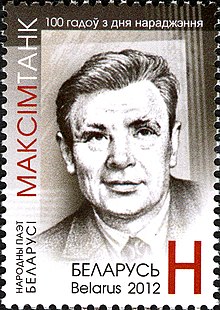Maksim Tank
| Maksim Tank Jaŭhien Skurko |
|
|---|---|
 |
|
| Native name | Яўген Скурко |
| Born | Jaŭhien Skurko Eugeniusz Skurko 17 September 1912 Piĺkaŭščyna, Russian Empire |
| Died | 7 August 1995 (aged 82) Minsk, Belarus |
| Resting place | Noviki, Miadziel Raion |
| Pen name | Maksim Tank, Aŭhien Bura, A. Granit |
| Occupation | Writer, journalist, editor, statesman |
| Language | Belarusian |
| Ethnicity | Belarusian |
| Citizenship | Poland Soviet Union Belarus |
| Period | Late 1920s – 1990s |
| Genre | Poetry |
| Subject | Belarusian national liberation, social issues |
| Years active | more than 60 |
| Spouse | Luboŭ Asajevič |
|
|
|
| Signature | |
| Chairman of the Supreme Soviet of the Belarusian SSR | |
|---|---|
|
In office 1963–1971 |
|
| Member of the Supreme Soviet of the USSR | |
|
In office 1969–1989 |
|
| Personal details | |
| Political party | Communist Party of the Soviet Union |
| Other political affiliations |
Communist Party of West Belarus |
| Awards |
Other medals |
Maksim Tank (Belarusian: Максiм Танк, Russian: Максим Танк, real name Jaŭhien Skurko; 17 September 1912 – 7 August 1995) was a Belarusian Soviet journalist, poet and translator.
Jaŭhien Skurko was born into a wealthy peasant family in the village Piĺkaŭščyna (Belarusian: Пількаўшчына), now in Minsk Voblast, Belarus. In 1914, his family went to Moscow as refugees from the approaching First World War and lived there till 1922.
Because of the hunger in Russia, the family returned to its home village, which by then became part of the Second Polish Republic.
In 1928, Skurko joined an underground communist youth organization in his school in Radaškovičy. Despite good performance in the school, in 1929 he was expelled together with several other pupils for participating in a protest against closure of Belarusian schools by the Polish authorities. He was also expelled from his following school in Wilno for participation in student protests.
In early 1930s, Jaŭhien Skurko participated in the Belarusian underground communist activism, writing for Belarusian and Polish underground publications. In 1932, he was arrested and placed in the Lukiškės Prison in Wilno.
In late 1932, he illegally crossed the border with the Soviet Union and joined Belarusian underground group in Minsk. He was eventually arrested by the Soviet authorities, interrogated by the NKVD and deported to Poland. After his return, he was an activist of the illegal youth branch of the Communist Party of West Belarus in Wilno and Navahrudak. He was several times arrested and spent a total of two years in prison.
In 1936, Skurko was admitted into the underground Communist Party of West Belarus.
...
Wikipedia
